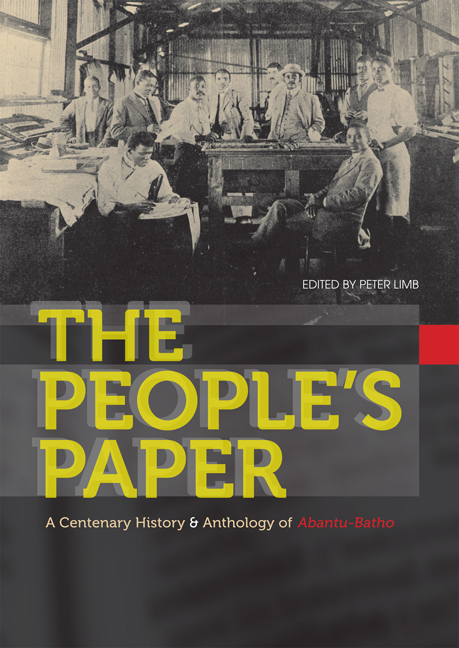Book contents
- Frontmatter
- Contents
- Contributors
- Acknowledgements
- Preface
- List of Abbreviations and Acronyms
- List of Illustrations
- PART I Essays
- Overview
- FOUNDERS AND EDITORS
- Chapter 3 Pixley Seme and Abantu-Batho
- Chapter 4 Queen Labotsibeni and Abantu-Batho
- Chapter 5 ‘We of Abantu Batho’: Robert Grendon's Brief and Controversial Editorship
- THEMES AND CONNECTIONS
- PART II Anthology
Chapter 4 - Queen Labotsibeni and Abantu-Batho
from FOUNDERS AND EDITORS
Published online by Cambridge University Press: 21 April 2018
- Frontmatter
- Contents
- Contributors
- Acknowledgements
- Preface
- List of Abbreviations and Acronyms
- List of Illustrations
- PART I Essays
- Overview
- FOUNDERS AND EDITORS
- Chapter 3 Pixley Seme and Abantu-Batho
- Chapter 4 Queen Labotsibeni and Abantu-Batho
- Chapter 5 ‘We of Abantu Batho’: Robert Grendon's Brief and Controversial Editorship
- THEMES AND CONNECTIONS
- PART II Anthology
Summary
A book on Abantu-Batho needs to treat Queen Labotsibeni Gwamile Mdluli of Swaziland (c.1858–1925) fully so that the discourse can bring out the stories behind this major contributor who helped found and sustain it. While her supporting role has not been excluded from history, her voice is missing, as is her appearance in the paper itself. Moreover, very little has been written on her political activities that can inform how she came to be one of the important shareholders in this seminal newspaper. As one of the main players in the establishment of the paper, Labotsibeni has to be included.
While many writers touch briefly on Abantu-Batho's political role, very few comment on how it reported or represented women, or the extent to which women were involved in its operations, beyond stating that Labotsibeni was an important initial funder. In order to balance the telling of the story of Abantu-Batho, it is important to revisit the narrative of Queen Labotsibeni in ways that include women's actions in a patriarchal discourse that has always excluded them. In this chapter I retrace her activities and follow the actions and articulations excluded in previous works so that we can better explore her leadership role and understand how she became part of as important a venture as Abantu-Batho.
Literature on women's voices in Southern Africa has exploded in recent decades and scholars have been rewriting history to include omitted women's voices. Patriarchy leads to women's ‘veiled voices’ and the relative silence on women in history leaves a gaping knowledge gap across the region, but the oral text is a major source to help us recreate this lacuna. We can help make history ‘inclusive’ by including women through acts of ‘recovering’ stories by women and ‘restoring’ their story in history. Recently, the role of African queens and queen mothers has received greater attention, but has not been related to the black press.
A gendered history of the African press is long over due, and this chapter, while not a detailed analysis of all aspects of gender (female and male) in Abantu-Batho, does address some major issues to do with women and the broadsheet, and is thus a contribution towards this end.
- Type
- Chapter
- Information
- The People’s PaperA Centenary History & Anthology of Abantu-Batho, pp. 128 - 150Publisher: Wits University PressPrint publication year: 2012



